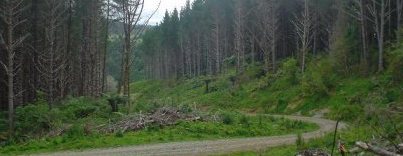TIIIIMBERRRR!
If you have 240,000 Ha. of forest on your shopping list or a cool $1.35bn in your pocket the chances are you've heard from Graeme Hart in the last few weeks. Harts' Rank Group is about to go to market with the former Carter Holt Harvey forest estate it purchased earlier this year. Aside from being the biggest forestry land deal in NZ history it offers some insight into the NZ Governments' climate change policy dithering. One of the key reasons we will have a deficit to make up on the international carbon market is that the rate of forest replanting has fallen dramatically since 1990. There are fewer trees to hold our increasing fossil fuel emissions - which we committed to doing in ratifying the Kyoto Protocol.
Aside from being the biggest forestry land deal in NZ history it offers some insight into the NZ Governments' climate change policy dithering. One of the key reasons we will have a deficit to make up on the international carbon market is that the rate of forest replanting has fallen dramatically since 1990. There are fewer trees to hold our increasing fossil fuel emissions - which we committed to doing in ratifying the Kyoto Protocol.
A drive through the central North Island reveals all. Vast areas of former forest land are being made over to pasture. Not surprising, since Govt. forest policy includes the imposition of a financial penalty on land conversion from the end of 2007. This is a key cause of the presently high land conversion rate. Harts massive sale makes sense as bidders will have (just) enough time to consider their options prior to the penalty deadline.
Because Rank Group also owns timber processing facilities there will be tie-ins for forest buyers in order to maintain a steady supply of wood. This does little for the fact that the world is so goggle-eyed-thirsty for our milk products that the land price pressure for conversion of forest land to dairy will remain in the immediate term. Climate policy must consider this in adequately recognising the quick-fix potential of forest sinks. Forest industry representatives have been clear in their dislike of policy proposals so far - including the de-forestation penalty.
The risk is of course that rather than being a potential short-medium term solution to the NZ Kyoto deficit, the Hart/Rank sale may well lead to exacerbation of it. With an eye to land use dynamics, it appears that in terms of greenhouse gas accountability, the dairy sector is passing the buck to forestry. With the 2007 de-forestation penalty looming, Hart is reducing exposure to risk of future land use inflexibility.
Although forestry has the potential to be a catalyst for a carbon neutral NZ, it is our consumption habits that are the core cause of fossil fuel emissions. Can Government create the incentive environment for a vibrant forestry industry? Will a they send a message to consumers with some form of carbon tax? The coming climate change policy release will be interesting...
Thursday, June 22, 2006
Subscribe to:
Post Comments (Atom)



No comments:
Post a Comment